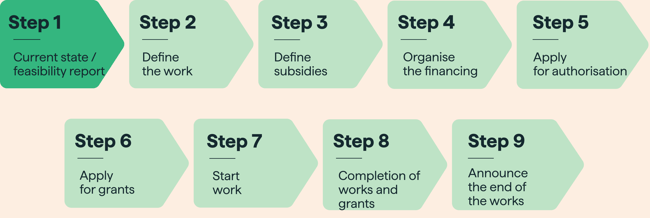Real estate: how to preserve and increase the value of your property while protecting the planet?

-

Boris Rechberger Head of Financing Solutions

On January 1st, 2023, the Swiss Bankers Association (SBA) issued new guidelines for its members concerning the improvement of energy efficiency in buildings, particularly for older properties.
The aim is to contribute to sustainable development in accordance with the guidelines of the Federal Council, by raising awareness among mortgage-holders and strengthening the Swiss financial centre, through expertise from financial intermediaries.
Financial institutions are required to advise and support their clients in maintaining the value and energy efficiency of their real estate properties. However it is also their responsibility to build awareness amongst their clients of the long-term preservation of their overall wealth, by directing them to the appropriate professionals as necessary.
In this context, it is important, when acquiring real estate, to ask the right questions. The issue of location, or the quality of the property as compared to the price asked, remains fundamental, but not solely.
Indeed, it is also important to consider any necessary renovation works, especially energy-related ones, particularly for buildings built before 2000 which generally consume more energy than newer constructions, in order to preserve the building's value.
What fundamental questions should I ask myself when acquiring real estate?
- What is the geographical location of the property in relation to the main amenities required: schools, public transport, shops, etc.?
- What is the quality of the materials used in construction: traditional materials, prefabricated, wood, etc.? Is there any presence of asbestos?
- What is the year of construction: before or after 2000?
- What is the type of heating production: fossil energy (oil, gas), electric, heat pump (in which case what a kind), pellet boiler?
- Does the property have photovoltaic or thermal panels?
How to obtain energy diagnostics for buildings?
There are several energy certificates and labels in Switzerland:
Diagnostics
- Certificat CECB (Cantonal Building Energy Certificate): This certification is necessary or planned for in case of the sale of an existing residential building or the replacement of a heating system powered by a non-renewable source of energy with a new installation. The CECB is mandatory in the canton of Vaud but remains optional in Geneva, Neuchâtel, or Valais.
This certificate indicates the current situation and future proposals.
He features three levels of assessment: the efficiency of the building's envelope, the overall energy efficiency, and the direct CO2 emissions produced on-site by the building. - CECB PLUS certificate: this represents an extension of the standard certificate, offering a series of benefits, notably an additional advisory report indicating improvement measures.
- CECB NEW BUILDING certificate: this sets target values to achieve the planned energy efficiency, positively influencing the operation and use of the new building.
Labels
- Label MINERGIE: This is a standard for renovation and new build, but does not provide diagnostics of the current situation. At the heart of this label we find guaranteed comfort thanks to a high-quality building envelope and systematic air renewal, above-average thermal protection, and comprehensive quality insurance.
- Site 2000 watts: 2000-watt certification criteria focus on energy efficiency, climate neutrality and renewable energy supply.
- SNBS BÂTIMENT: The Swiss Sustainable Building Standard (SNBS) covers renewable energies, reduction of greenhouse gas emissions, and environmentally friendly construction and operations, as well as social services and transport.
Labels exclusive to Geneva
- HPE (Haute performance énergétique - high energy performance) certifies that new buildings comply with a set of standards that include the requirements of thermal regulations, compliance with an overall energy performance level for the building that exceeds the regulatory requirement, and minimum inspection procedures.
- THPE (Très haute performance énergétique - very high energy performance), which certifies a certain level of overall energy performance for a building that exceeds the regulatory requirements.
What are the advantages of renovation for energy-efficiency?
Energy-efficient renovation offers a number of advantages:
- Reduce costs: replacing heat production from fossil fuels with more sustainable options can lead to a substantial reduction in CO2 emissions and, consequently, heating costs. In a standard single-family home that has not yet been renovated, heat loss for reasons relating to the construction envelope itself causes greater energy-consumption.
- Subsidies: the funds invested in renovation can attract subsidies of up to 30%.
- Tax advantages: works may themselves add value to the property, in addition the cost of renovations is deductible with regards to income tax calculations.
- Increase in property value.
- Increased comfort in winter and summer.
- Reduced impact of energy costs.
What types of works help to reduce costs?
You can improve the energy efficiency of your property by focusing on three aspects: heat production, electricity generation, and thermal insulation. Here are some examples of energy-efficient renovations:
- Heat Production:
- Air-water heat pump. In terms of benefits, this can be connected to the existing heating system and does not emit CO2.
- Geothermal heat pump. This offers the same advantages as the air-water heat pump but functions independently of seasonal variations.
- Heating installation using pellets/logs/wood chips. The advantage of wood is that it is CO2 neutral and sustainable.
- Solar thermal panels, producing domestic hot water and/or providing additional support for heating installations.
- District heating. Provided such an installation is feasible, it allows for direct hot water supply via a network of pipes, intended for heating the property or for producing hot water.
- Natural-gas boiler; this is an option if the property can be directly connected to the natural-gas network. - Electricity Generation:
- Photovoltaic installations. The principle is solar modules directly converting solar radiation directly into electrical energy, without emitting any emissions. - Thermal Insulation:
- Improving the property's insulation would lead to a reduction in heating needs.
What types of subsidies are available for the works mentioned above?
Federal and cantonal subsidies are available for all the kinds of works described above.
Here are some useful links for the cantons of Geneva, Vaud, Neuchâtel and Valais:
- Ordinance on the Promotion of the Production of Electricity from Renewable Energy Sources | admin.ch
- Apply for an energy efficiency grant | ge.ch
- The measures | Genergie (ge-energie.ch)
- Directive on high (HPE) and very high (THPE) energy performance certificates | ge.ch
- Applying for a grant to install solar thermal collectors | État de Vaud (vd.ch)
- M02 Applying for a grant to install a wood-burning heater with a day tank (logs or pellets) | État de Vaud (vd.ch)
- M03 Applying for a grant for an automatic wood heating system, rated output < 70kW | État de Vaud (vd.ch)
- M07 Applying for a grant to connect to a heating network | État de Vaud (vd.ch)
- Grants - Republic and Canton of Neuchâtel
- Resume_PBNE.pdf
- Promotional programmes - - vs.ch
Renovation steps

Support available from certain banks
Some banks, based on an exemplary construction standard (energy certificates) and under certain conditions, offer mortgage or construction/renovation loans at attractive rates.
Indeed, considering that investments in this type of buildings are more secure as they enable an improved energy performance, this reflects positively in the increase of the property's value.
When purchasing an existing real estate property, whether it is a house or an apartment, it is necessary to inquire about the work carried out to date (amount(s) and year(s) of completion) and the necessary future work (building envelope or energy requirements). Do not hesitate to request the CECB certificate if it exists (mandatory in the canton of Vaud) or any other energy diagnosis.
Indeed, a "love at first sight" can turn out to be, ultimately, a bad acquisition with high renovation costs, unfortunately not anticipated in the initial budget.
However, let's not forget that the decision ultimately resides with the owners.
Would you like to learn more about energy renovation? Join our webinar on the 21st of March!
Author
-

With a twenty‑five‑year career at Banque Migros, where he notably headed the Private Clients department during five years, Boris Rechberger then brought his expertise to BCGE for fourteen years as Head of Property Managers and Real Estate Investors. In 2022, he joined Piguet Galland and founded the Financing Solutions unit within the Wealth Solutions department.


.png?width=488&height=440&name=Rectangle%2034624665%20(6).png)

